Julian Eaves reviews Shook, a play by Samuel Bailey presented by Papatango at Southwark Playhouse.
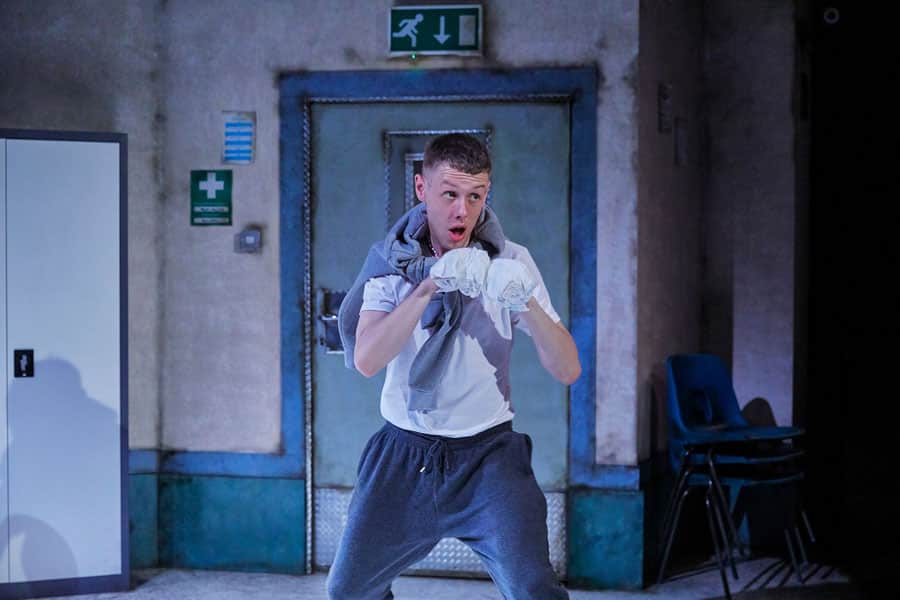
Shook
Southwark Playhouse Little,
1st November 2019
5 Stars
Book Now
It has been quite a week for new openings and new works, with some classy offerings being presented. Indeed, it is almost as if, as standards in public life continue to slide, the theatre seems to be creating a counter-balance in turning out ever more stratospherically high-quality art. For here at Newington Causeway in South London, where it starts a high-profile national tour with producer Chris Foxon’s Papatango company (to be continued at the Hope Street Theatre, Liverpool, Theatr Clwyd at Mold, the Stephen Joseph in Scarborough, and the Marlowe at Canterbury, although, at this rate, I would not be at all surprised if a number of other venues were added to this very-likely-to-sell-out run), another brilliant gem is mounted for our inspection, enjoyment and edification.
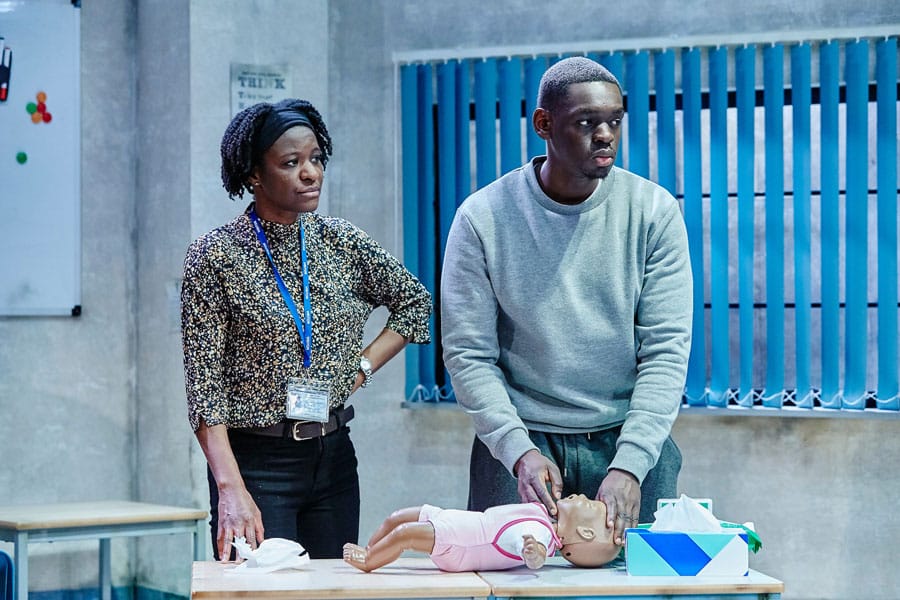
The author, Samuel Bailey is a new name in playwriting. Originally from the West Midlands, he developed work with the Bristol Old Vic, Tobacco Factory Theatres and Theatre West, before he moved up to London and became an alumnus of the London Old Vic 12 and Orange Tree Writers’ Collective. Initially supported by an MGCfutures bursary, ‘Shook’ is his first full-length play (90 minutes, no interval), and it is one of the most devastatingly accomplished and powerful debuts I have ever seen. This guy is colossal. Last night, by the time we reached the end of his extraordinarily compressed and adept investigation of three men at a Young Offenders’ Institution, the whole audience at the intimate, 120-odd seater space were of one mind, it seemed, in recognising that we had just witnessed one of the most important theatrical debuts of the decade.
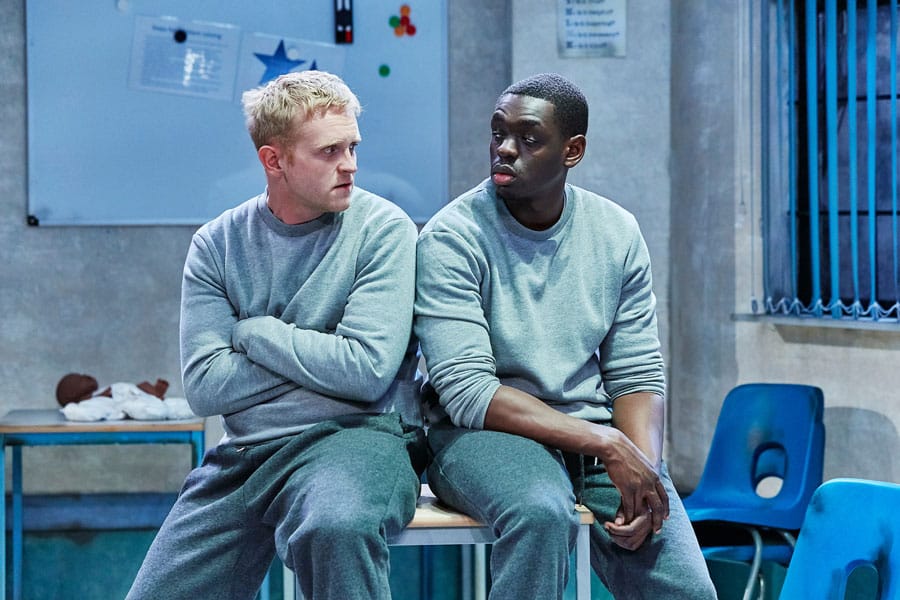
Bailey’s gift – and it is a major one – is in his knack for taking everyday people and making them stand for huge ideas and extremely powerful emotions, all with the utmost discretion and legerdemain, hardly allowing us to be aware of the considerable artistry employed to achieve his effects. Thus it is that in this apparently simple, bare and almost action-less production by director George Turvey (co-founder and artistic director of the company), we are drawn unwittingly deeper and deeper into the lives of the three young men, almost without even noticing the extent to which we become fundamentally committed to caring about their destinies. In the stark, classically ‘naturalistic’ set by Jasmine Swan (extended stealthily into every last detail of the costuming, too), we are given an ostensibly conventional and unsurprising ‘room’ in which the narrative plays out. It is pitilessly lit by Johanna Town, and buffeted by Richard Hammarton’s tough music and sound design. Bailey nonetheless puts air and space into this world when he seemingly takes his foot off the accelerator and punctuates its progress with six interruptions: these allow time to pass – noted on the classroom whiteboard – and, more importantly, they permit the unseen but occasionally heard outside world to exert its influence upon the lives of our three (anti-)heroes.
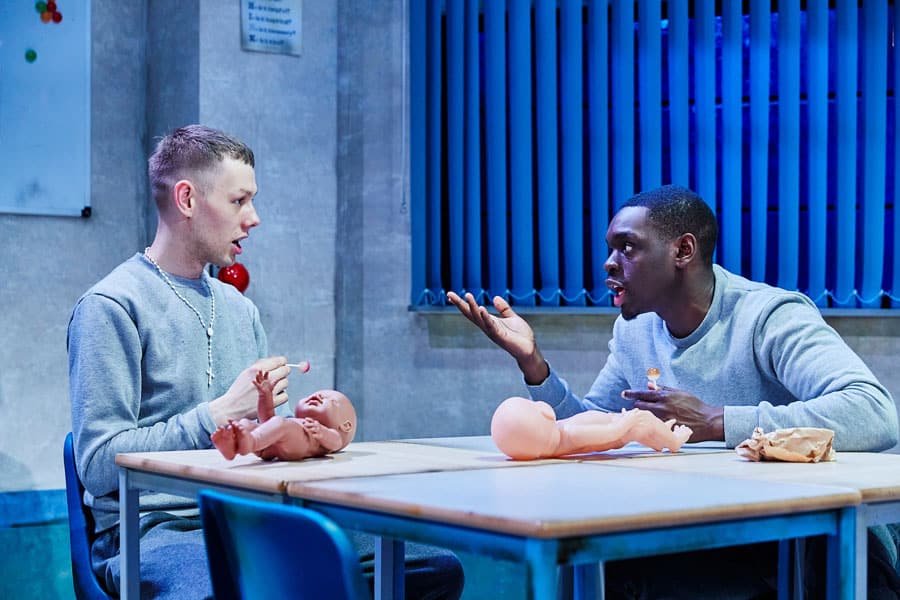
The model for this is, of course, ‘Haute surveillance’ (‘Deathwatch’) by Jean Genet – the ‘ne plus ultra’ of prison dramas, where endless posturing and manoeuvring by three convicts achieves the status of a mythical examination of the human condition. Here, the dance is complicated by the physical presence in the midst of a woman (‘Notre Dame des Fleurs’?), and she is called by the aptronymic name, Grace. Her job, functioning very much as an almost but not quite divine intervention in their lives, is to run a ‘parenting’ class: all three are or are soon to become, fathers. Their children, however, remain a long way distant, separated from them by the merciless strictures of the British penal system – the men never even produce a photograph of their children – but they do get to use plastic dolls to ‘practise’ essential parentcraft skills upon the woeful inadequacy of these ‘toys’ to stand in for the real thing becomes, ultimately, the physical incarnation of this heart-breaking tale. Andrea Hall is perfect as the well-meaning but inevitably somewhat distant teacher, quietly dedicated to trying to bring humanity into the metal-grey interior of the institution, and all too well aware of the often doomed hopelessness of her task. The UK (while it still exists) has one of the highest rates of incarceration – and re-offending – in the developed world. Nothing to be proud of, and nothing we can blame on Brussels.
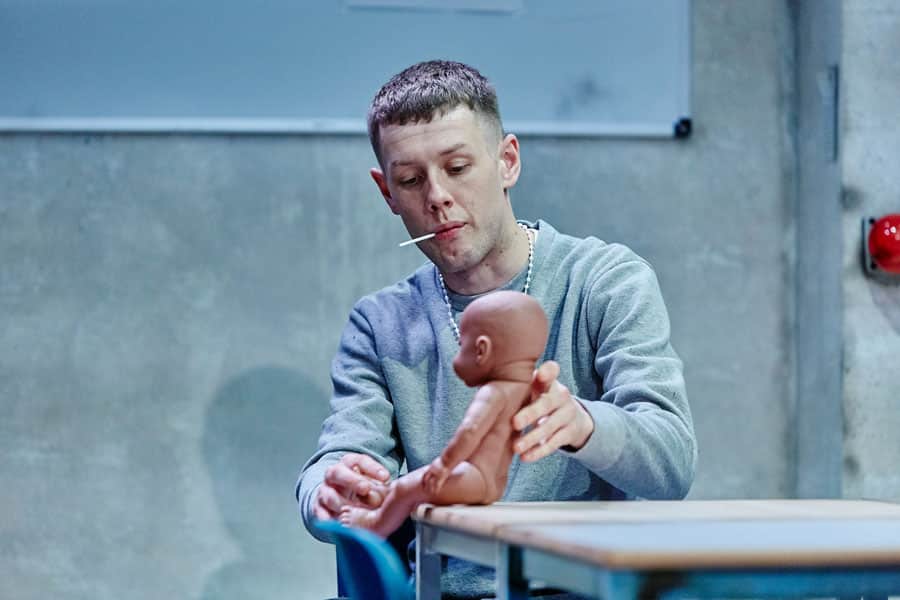
But it is the trio of locked-up youth who consume our interest. Bailey’s exact ear for truth in dialogue and his preternatural mastery of pace, momentum, structure and changes of tone enable him to furnish these three with handsomely finished roles of the kind that we associate with considerably more experienced writers. Josh Finan is the noisy whirlwind, Cain (another aptronym!), whose violently balletic energy provides the main ‘shaking’ force in the drama. His intended victim, Josef Davies’ cripplingly introverted and damaged Jonjo is the one who changes most before our eyes, growing in confidence and becoming more relaxed, as he opens up to reveal the full horror of what events have led him into this cell. But cock of this walk is actually Ivan Oyik’s sullen, smouldering, streetwise and smart-talking Riyad (another name full of powerful associations): he is also the fulcrum around which pivots so much of the humour in their richly dynamic and hearty banter.
Ultimately, although they never, never stoop to asking for a thing, these three with messed up and dangerous lives conclude by completely winning over the hearts of the audience. And when we give them that care, that thought, that commitment, we do wonder why it is that so much of our society seems incapable of reaching them in a kindly, nurturing way. It is a sobering reflection to take away from the theatre, and – you never know – that might just do some good. In his acknowledgements in the published text of the play (that doubles as programme), Bailey leaves the last word to, ‘the lads back home, who think theatre is rubbish, but are, in some form, in every play I’ve ever written’. This is for them because they are us.
